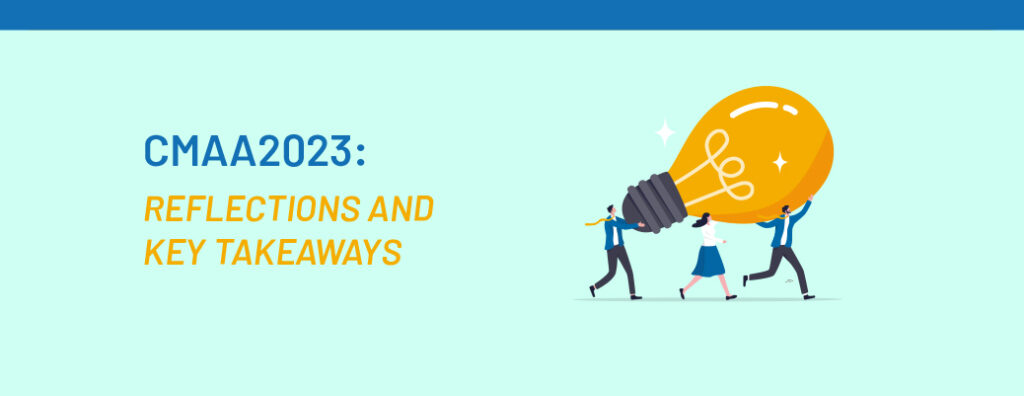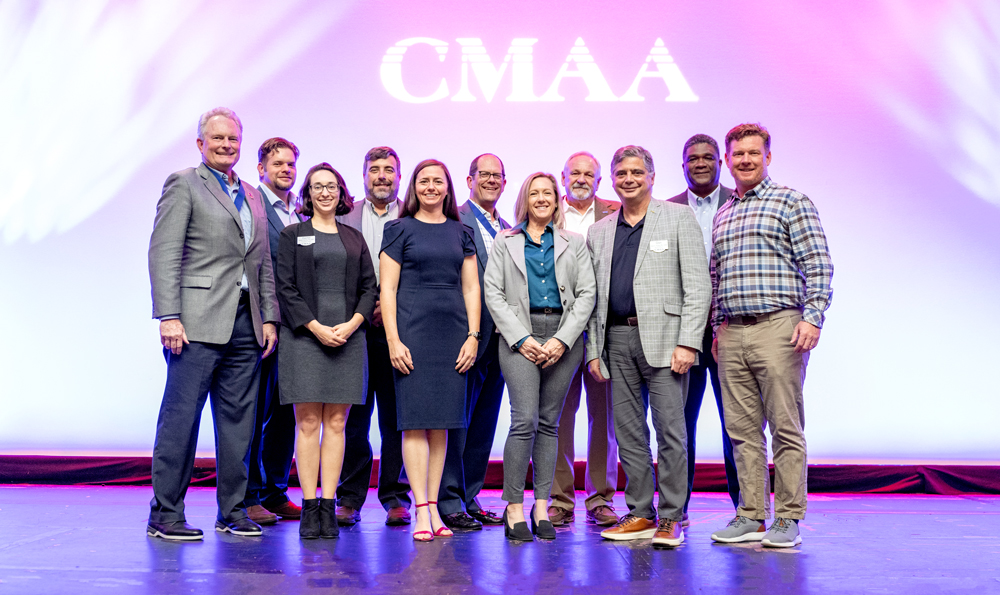
Last week, several MBP team members attended the Construction Management Association of America’s national conference, CMAA2023, in Washington, DC. This was CMAA’s most attended conference to date and brought together industry leaders from across the country to network and exchange knowledge, ideas, and insights. There was a lot to unpack from this three-day conference, so we thought we’d have some of the MBP leaders in attendance share some key takeaways from their experience at CMAA2023 – what they learned, what’s coming up, and their enthusiasm for the future of construction management:
Chris McLuckie, CCM, PDRI, Assoc. DBIA, Service Executive
“My biggest takeaway was a blending of several different sessions I attended. The construction industry is embracing technology at a faster rate than I’ve seen in my career, and this provides us with many advantages. One of which is working more autonomously, using shared file systems, drones, 360-degree cameras, digital twins, virtual meetings, and a variety of software to accomplish our tasks. This simultaneously creates a different set of challenges, such as building team member relationships, maintaining engagement, creating career paths for younger team members, and sustaining that ONE TEAM feel that MBP has worked so hard to make a part of our culture. It also creates a training challenge. How do we train new team members not just to use the software and technology but to understand the outputs and how it applies to and impacts a project.”
Chris Payne, PE, CCM, President and Chief Executive Officer
“This was the largest conference ever, and I am encouraged that interest in CMAA remains very high! I have noticed that those attracted to CMAA and who then stay involved are people who appreciate building long-term relationships with industry colleagues. After many years, I value those I have built, and I continue to enjoy building new ones with the next generation of construction managers. My top-line takeaway from not one but two economists presenting at the conference was that since the pandemic, the construction industry has become less productive (as measured by economic inputs and outputs). The more convincing explanation is the loss of experienced personnel to retirement, but I believe that data reflects second-order impacts from insufficient labor and supply chain disruptions. To address this, it’s crucial that we understand the evolving needs of our industry’s workforce and adapt our processes and approaches accordingly to ensure our ongoing success.”
Don Young, PE, CCM, F.SAME, Executive Vice President, Operations and Organizational Development
“The Talent War remains a challenge for the AEC Industry, and firms and agencies struggle to retain and recruit for their future needs. Several unique approaches with positive results were discussed in breakout sessions at the conference. Professional development and career pathway discussions are integral parts of any retention program. For professional development, the stackable credentials of CMAA (CMIT, CACM, and CCM) remain very popular, with steady growth within each one. It is also a good training program for non-traditional consultants without a formal engineering education background. Also, a best practice for performance reviews and mentoring sessions is to include a career path discussion to assist in seeing the big picture way ahead.”
Jennifer Hamby, CCM, CM-Lean, LEED AP BD+C, Project Manager
“I was impressed with the number of attendees and the diverse markets represented. There was an underlying theme in many sessions regarding how the construction industry continues to struggle with employee retention and skyrocketing material and labor costs and that we haven’t even hit the peak yet. We are all united to overcome these obstacles and influence change. Identifying and managing risk continues to be a hot topic, as well as determining the right project delivery method. As construction managers, we should be influencing and educating our owners on choosing the right method of delivery for the best possible outcome. I attended a session, “What the Next Generation Must Learn to Succeed,” focused on recruiting efforts and learning to adapt to this growing workforce. This next generation’s work ethic and values are not the same as previous generations for many reasons, but overall, they value a clear path to advancement, affirmation, and recognition along the way. Our industry needs to continue to shift our focus to these areas to aid in employee retention.”
Jeff Thatcher, PE, CCM, Service Executive
“I’ll add that there was great networking between the leaders of various chapters from across the country and a lot of sharing ideas on approaching common problems. It’s still amazing how a 2000-member chapter on the West Coast and a 400-person chapter from the East can mutually benefit each other!”
John MacKay, PE, CCM, CFCC, Chief Operating Officer
“One of my key takeaways is that there seems to be a greater desire from owners to engage more proactively with construction managers and general contractors to help develop the construction workforce – from trade contractors to construction managers to consultants. As we continue to see a shortage of assets within the construction industry and recognize that technology is not at a stage to bridge the gap entirely, it is vitally important for all participants in the industry to identify new solutions to this growing issue.”
Kim Forbes, CCM, PSP, LEED AP, Service Executive
“Attending CMAA2023 coming off the heels of the 2023 Lean Construction Institute (LCI) Congress, gave me a slightly different perspective. LCI attendees included large and midsized general contractors, enhancing process improvement throughout the project lifecycle. CMAA attendees included consultants providing construction management services primarily to owners to manage projects effectively. Both events offered unique perspectives on the construction industry, and we need to continue to make strides to be in the room together to help address the challenges highlighted throughout the CMAA conference – lack of workforce, recruiting, productivity, mental health, education, and growth. It requires everybody to do their job and work together. MBP has developed strong capabilities to help aid in pursuing both directions. We need to keep that momentum to continue to find solutions and progress the construction industry.”
Mairav Mintz, PE, CCM, PRMP, Executive Vice President, Service Strategy and Delivery
“What I heard from the industry at the conference is that to deliver big projects successfully requires BIG THINKING. It starts with selecting just the right project delivery method for the project’s specific circumstances, and it expands from there to implementing critically important communication and decision-making protocols, fostering collaboration, defining metrics, monitoring performance, and creating a feedback loop to incorporate lessons learned and continuously improve deftly. How does this all get done? With the ever-increasing volume of work and labor shortages, construction managers will need to invest in transformative technologies to increase efficiencies (work smarter!). Risks abound right now, and construction managers must remain nimble and creative to mitigate those risks.”
Michael Lussier, PE, CCM, Project Manager
“My biggest takeaway centered around inclusivity. Given the current constraints of our industry – funding, workforce availability, productivity performance, and average level of experience – the overarching focus for project teams should be leveraging all stakeholders’ perspectives to encourage active participation. Be it technology-focused tools to make the project tangible to everyone, building coalitions between experts to develop new, innovative construction strategies, or leveraging labor practices focused on promoting equity in hiring to foster happy projects, the construction management profession must facilitate project delivery frameworks that ensure all voices are not only heard but also informed and set up for success on projects. We must encourage our teams to push the envelope and be excited about shepherding our industry into its next era.”
Niyi Ladipo, CCM, CCP, EVP, Service Executive
“I heard a lot about the collaboration of project participants and the importance and benefits of starting this much earlier in developing a project. The importance of the relationships between the teams was also highlighted. I liked seeing younger, mid-career attendees presenting and sharing their successes on projects.”
Rachel Fleming, PE, CMIT, CM-Lean, Project Manager
“CMAA2023 marked a historic milestone as the largest annual conference to date, reflecting an exciting era for the construction industry. Amid this enthusiasm, there’s a recognition of challenges – a wealth of data leading to information overload, coupled with a push towards improving diversity, equity, inclusion, and belonging. Discussions revolved around retaining early and mid-career professionals and emphasizing the significance of ongoing training. Moreover, there was a focus on leveraging technology for increased productivity and exploring efficient tools. The importance of effective teamwork and communication was highlighted, as well as the significance of comprehensive documentation in streamlining processes. These focal points underscore the industry’s dedication to progress, albeit acknowledging the work still needed for further advancement.”
Steve Pancham, CCM, Vice President, Area Manager
“My overall takeaway was that the future of the projects and services we provide in the construction management industry will continue to push technology – especially artificial intelligence (AI) to reduce risks. Utilizing AI to predict when a project or an issue will go wrong ahead of time is an exciting approach to how we as construction managers will handle future projects.”
What’s Next?
Leaving CMAA2023, our team felt the collective energy of construction managers from across the country eager to shape the future of successful projects and programs. While the conference highlighted challenges such as workforce shortages, productivity concerns, and the need for technology adoption, it also emphasized the movement towards more inclusivity and fostering relationships within the construction management profession. As we look ahead, we are ready to lead the way in the ever-changing landscape of construction management by addressing industry challenges, exploring new tools, fostering positive change, and providing better project outcomes for our clients. We’re already excited for CMAA2024!




